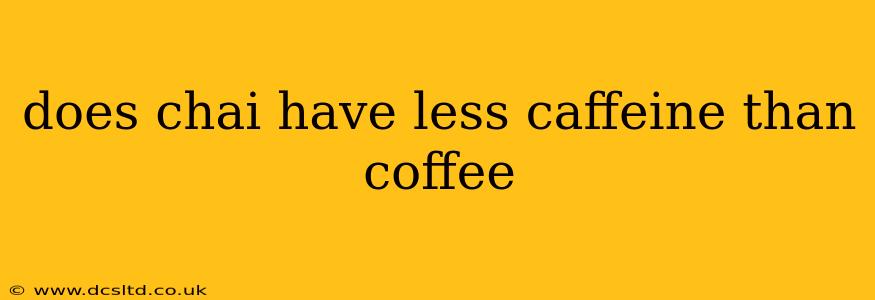Does Chai Have Less Caffeine Than Coffee? A Comprehensive Comparison
The simple answer is yes, chai generally has significantly less caffeine than coffee. However, the exact amount varies considerably depending on several factors. Let's delve into the details to understand why and how much less caffeine you'll find in your favorite chai latte compared to your morning cup of joe.
What is Chai?
Before we compare caffeine levels, let's clarify what chai actually is. Chai, often called masala chai, is a spiced tea beverage originating in India. It's typically made by brewing black tea with a mixture of aromatic spices like cardamom, cinnamon, ginger, cloves, and black pepper. Milk and sugar are commonly added. The key ingredient driving the caffeine content is the black tea itself.
How Much Caffeine is in Coffee vs. Chai?
A standard 8-ounce cup of brewed coffee contains approximately 95-165 milligrams of caffeine. This range depends on the type of bean, roast, and brewing method.
In contrast, an 8-ounce cup of chai made with black tea typically contains between 20-40 milligrams of caffeine. This much lower amount is primarily because chai often uses a smaller quantity of black tea leaves compared to the amount of coffee grounds used in a typical cup of coffee. The addition of milk and spices doesn't significantly alter the caffeine content.
What Factors Affect Chai's Caffeine Content?
Several factors can influence the caffeine level in your chai:
- Type of Tea: The type of black tea used significantly impacts caffeine. Stronger black teas like Assam will naturally contain more caffeine than milder varieties.
- Amount of Tea Used: More tea leaves brewed in the same amount of water will result in a higher caffeine concentration.
- Brewing Time: Longer brewing times generally extract more caffeine from the tea leaves.
- Chai Concentrate/Pre-made Mixes: Pre-made chai concentrates or mixes can vary significantly in their caffeine content. Always check the label for specific information.
Does Decaf Chai Have Caffeine?
Even decaf chai will contain a small amount of caffeine. Decaffeination processes aim to remove the majority of caffeine, but typically, some traces remain. Expect significantly less caffeine in decaf chai than in regular chai, but it's not entirely caffeine-free.
Is Chai Healthier Than Coffee?
While chai generally has less caffeine than coffee, neither is inherently "healthier." Both offer potential health benefits and drawbacks depending on individual factors and consumption levels. Chai often contains beneficial antioxidants from the spices, but the added sugar and milk can significantly impact its overall nutritional profile. Coffee, on the other hand, is a rich source of antioxidants but can increase anxiety in some individuals due to its higher caffeine content.
What are the Effects of Caffeine?
Caffeine is a stimulant that can boost alertness, energy levels, and cognitive function. However, excessive caffeine consumption can lead to anxiety, insomnia, headaches, and digestive issues.
Conclusion: Chai is a Lower-Caffeine Alternative
For those sensitive to caffeine or seeking a lower-caffeine alternative to coffee, chai tea offers a flavorful and comforting option. While the caffeine content can vary, it typically contains significantly less caffeine than a comparable serving of coffee. Remember to always consider individual sensitivities and choose the type and quantity of chai that suits your needs.
